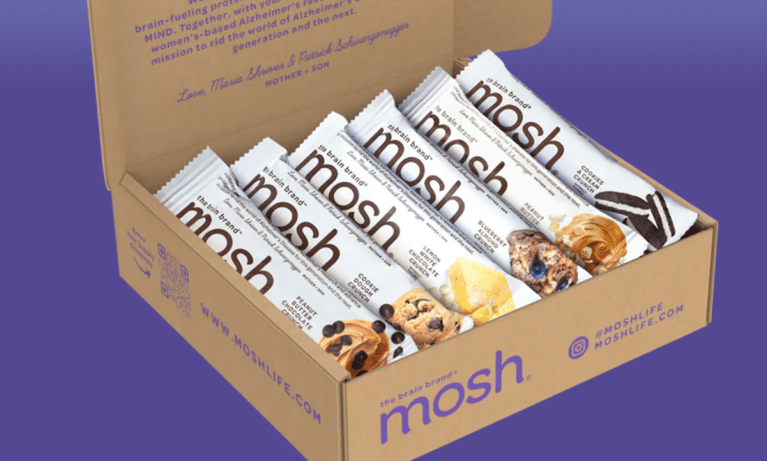Patrick Schwarzenegger’s Mosh Targets Cognitive Concerns to Stand Out in D2C Snacks

Amid a seemingly overwhelming array of nutrition bar options in stores and via direct-to-consumer (D2C) channels, Mosh is touting brain benefits in an effort to win customers in the highly competitive space.
In an interview with PYMNTS, Patrick Schwarzenegger, CEO of the snack brand, which has sold more than 2.5 million protein bars via D2C and which recently announced a $3 million Series A funding round, spoke to the demand for foods that promise cognitive health benefits in this crowded category.
“During COVID, cognitive functionality, cognitive decline — that became a huge trend among consumers,” Schwarzenegger said. “They’re trying to find out more and more so what their products are going to do for them beyond the protein element or the no sugar element, et cetera. So, we really wanted to create something around brain health.”
Indeed, consumers are more focused on wellness than they were before the pandemic, and engagement is only growing. For instance, PYMNTS Intelligence from the report “Connected Wellness: What’s Next In The Connected Economy,” created in collaboration with CareCredit and based on a survey of more than 3,200 U.S. consumers, showed that, as of last summer, the share of consumers using digital preventative healthcare tools grew to 57%, up from 53% the previous fall.
Indeed, Mosh has seen consumers quick to get onboard with the benefits it has touted.
“We’ve had a very successful first few years, and now it’s just really about putting fuel on the fire,” Schwarzenegger said, noting the brand is looking both to continue to drive eCommerce adoption and to lay the groundwork for a retail launch.
Many consumers are purchasing snack foods online. PYMNTS’ study “Changes in Grocery Shopping Habits and Perception,” which draws from a survey of a census-balanced panel of more than 2,400 U.S. consumers, reveals that less than half (48%) of grocery shoppers purchase the majority of their packaged items from physical grocery stores, while the remaining 52% purchase these primarily via digital channels.
Regardless of the channels on which consumers are purchasing these products, in the current inflationary environment, many grocery shoppers are being more conservative in how they choose which snack foods to buy. PYMNTS’ “Consumer Inflation Sentiment Report: Consumers Cut Back by Trading Down,” which drew from an April survey of more than 2,000 U.S. consumers, found that about 1 in 3 grocery shoppers have switched to a less expensive merchant for snack foods.
This hesitancy is a key hurdle for Mosh, and it will remain so until the firm reaches widespread distribution and adoption.
“Customers that really prioritize their health and understand what’s in the product are willing to pay a premium price for that. Of course, there are always customers that that won’t come to us because of our price,” Schwarzenegger said. “I mean, price is the number one reason customers don’t return. But until we really get economies of scale, and we’re growing to a $50 million+ business, we won’t see massive price breaks on the product.”